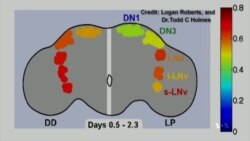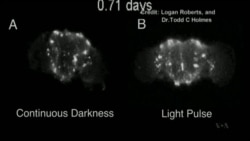A plane ride across time zones can throw off your biological clock, sometimes for days. Fruit flies can suffer from jet lag, too. A new study of their brains reveals why, and suggests ways we humans can avoid it.
In lab experiments, researchers at the University of California, Irvine, removed the brains of genetically-engineered fruit flies and kept the brains alive in petri dishes. They off-set their circadian rhythm by two hours using pulses of light. Light is the most powerful environmental cue for re-setting our biological clock.
They used a highly sensitive camera to make movies of the activity of individual neural circuits of the jet lagged brains.
“The study marks the first time we’ve seen this in real time,” according to Logan Roberts, a PhD student at the University of California, Irvine, and lead author of the study in the journal Current Biology.
"The activity is measured by the amount of light these single neurons emit,” he explained. “They have a firefly gene engineered into these flies, so that when these cells are active, they literally light up in the brain and we can measure that activity."
The study describes how specific neurons react to light cues that simulate rapid travel across time zones.
“And we can see that some of these cells change their activity when light is shown directly on them. They actually become desynchronized among the groups and within the groups.”
“That sense of de-synchronization, what you experience in jet lag,” Roberts said, “is your nervous system becoming de-synchronized within itself.”
Roberts said in that state, communication between certain neurons weakens. That is not necessarily a bad thing. He said using light therapy to temporarily reset your biological clock ahead of travel could help reduce symptoms when you arrive at your destination.
“We believe that if we can harness that and actually use that to actually induce this de-synchronization, this weakening of communications between these cells before jet lag, before you would travel rapidly across time zones, we believe that could actually accelerate recovery from jet lag,” he said.
Roberts said the model used to study jet lag in fruit flies could be applied in human conditions.
“When our body clock is disrupted,” he added, “We are put at greater risk for diabetes, cancer and neurological diseases like Parkinsons and Alzheimer’s.”







